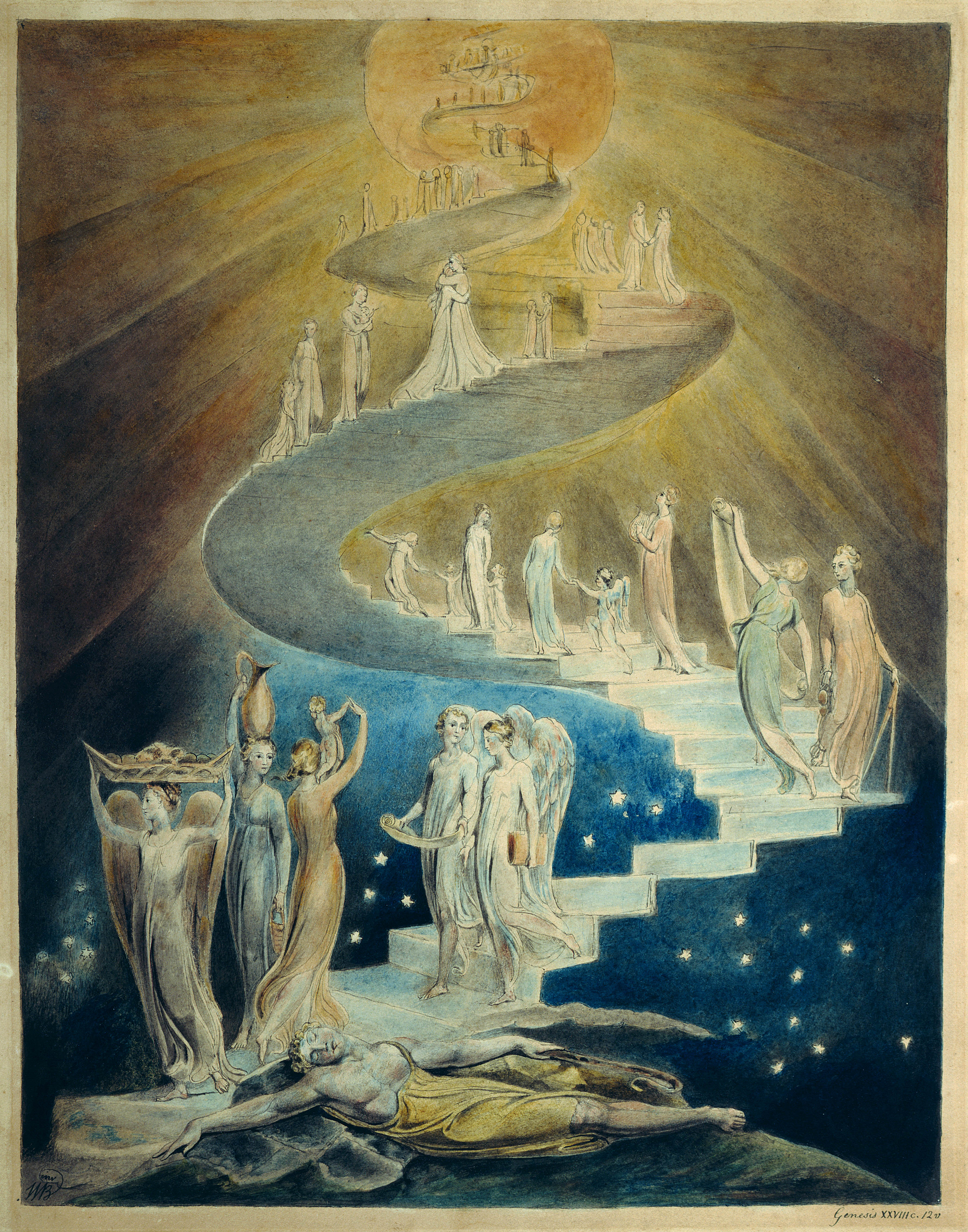("When through fiery trials thy pathway shall lie
My grace, all sufficient shall be thy supply
The flames shall not hurt thee, I only design
thy dross to consume, and thy gold to refine." How Firm a Foundation)
You can just bet that William and Karen both had their fair share of dross: twenty years for him, and 7 plus for her. In fact you can still see the furnace at work throughout their lives. Both of them gave a fair representation of the course of Everyman.
In terms of religious values: both dissented radically from conventional organized religious institutions. Blake heartily supported the American Revolution when we sent the Anglican clergymen home and declared the separation of Church and State. Armstrong left the convent and later withdrew from the Roman Catholic Church. They both propagated the idea of the God Within and the priesthood of the believer (which unfortunately has so often been mouthed by clergymen with hypocritic holiness).
In The Case for God you can get a fair picture of what Blake meant about Bacon, Newton and Locke, his symbol for everything wrong in his country and his age- philosophically, politically and spiritually:
In 1605 Francis Bacon, counselor to King James I, announced that there is no conflict between science and religion (Armstrong's The Case for God; p 187).
Isaac Newton, godfather of the Deists, believed that the earth was a mechanical object created by God with immutable laws. They came to feel that it was like a clock, made and wound up by God, who had no further interest in it. In this way Newton (perhaps unwittingly) abrogated all spiritual activity; like the Nominalists and Logical Positivists who came after him he implied that anything that could not be measured was meaningless, including the idea that one may have a relationship with God (cf The Case for God; pp 207-12).
John Locke completed the "Unholy Trinity"; his tabula raza simply infuriated Blake, who felt that coming down into this life we are (have been) heavenly creatures.
Karen understood very much as William did that the psychological forces represented by these three men had bent and corrupted England's Vision of God and led to an extreme materialism working havoc on the economic life of the people.
Armstrong's departure from 'the faith' was extended and deliberate: she left the convent, then left the church, considered herself a purely secular person (the type which incidentally made up probably the majority of English people), agnostic, atheist? But strangely enough she published more than twenty books about religion!
You have to call her a seeker. She moved decisively in the direction of Universalism as she wrote about Judaism, Islam, Buddhism; you name it! She might not have believed in God, but she served Him faithfully for many years.
Universalism tied Blake and Armstrong together, perhaps most significantly. She made sympathetic studies of the religions just mentioned, and likely many others. Blake would have concurred with this, one simple illustration being The Divine Image:
".....Then every man, of every clime,
That prays in his distress,
Prays to the human form divine,
Love, Mercy, Pity, Peace.
And all must love the human form,
In heathen, Turk, or Jew;
Where Mercy, Love, and Pity dwell
There God is dwelling too."
The Circular Staircase is the story of William's and Karen's lives, and of ours. Yes it's the story of Everyman.
 |
Wikipedia Commons Jacob's Ladder |
"We are climbing Jacob's Ladder"
Yep, William and Karen climbed, and so do I and so do you:
"We are climbing Jacob’s ladder,
We are climbing Jacob’s ladder,
We are climbing Jacob’s ladder,
Soldiers of the cross.
Every round goes higher, higher,
Every round goes higher, higher,
Every round goes higher, higher,
Soldiers of the cross.
Sinner, do you love my Jesus?
Sinner, do you love my Jesus?
Sinner, do you love my Jesus?
Soldiers of the cross.
If you love Him, why not serve Him?
If you love Him, why not serve Him?
If you love Him, why not serve Him?
Soldiers of the cross.
Yep, William and Karen climbed, and so do I and so do you:
"We are climbing Jacob’s ladder,
We are climbing Jacob’s ladder,
We are climbing Jacob’s ladder,
Soldiers of the cross.
Every round goes higher, higher,
Every round goes higher, higher,
Every round goes higher, higher,
Soldiers of the cross.
Sinner, do you love my Jesus?
Sinner, do you love my Jesus?
Sinner, do you love my Jesus?
Soldiers of the cross.
If you love Him, why not serve Him?
If you love Him, why not serve Him?
If you love Him, why not serve Him?
Soldiers of the cross.
No comments:
Post a Comment